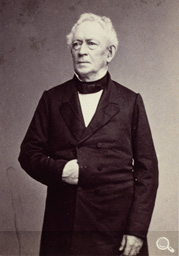

Dedication of the Soldiers National Cemetery, November 19, 1863
As the Confederate army retreated to Virginia, area residents and Pennsylvania officials considered how to deal with the carnage left behind. The Confederate dead were buried where they fell or nearby in shallow, mass graves. (Several years later, Virginians took the bodies home and reburied them, many in a Richmond cemetery.)
Edward Everett served as Massachusetts governor (1836–40) and U.S. senator (1853–54) and president of Harvard University (1846–49). The principal speaker at Gettysburg, he gave a two-hour oration that is remembered more for its length than its content. Photograph courtesy of National Portrait Gallery, Smithsonian Institution.
For Northern soldiers, local and national leaders came to support the idea of a national cemetery to bury and honor the dead who had fought to defend the Union. Organizers prepared for a dedication befitting the new memorial ground. The planners invited Edward Everett, the most celebrated speaker of the day, to give the central address. They also requested that President Abraham Lincoln attend and follow the main oration with "a few appropriate remarks."
Lincoln's remarks, rather than Everett's speech, are what we remember as "The Gettysburg Address." The battle, the dedication, and Lincoln’s address have become seminal moments in the history of the Civil War and the nation.
Landscape architect William Saunders's symmetrical plan, with graves arranged by state, highlighted the participation of each state's soldiers who fought for the Union at Gettysburg. Courtesy of Abraham Lincoln Presidential Library and Museum.
An estimated 10,000 people crowded into Gettysburg on November 19, 1863, to witness the dedication of the cemetery. In this rare photograph of the event, with the audience pressed in to hear the speakers, Lincoln (seated and hatless) is barely recognizable. Lincoln’s speech was so short that most of the photographers who had come to record the occasion missed their opportunity. Photograph courtesy of National Archives and Records Administration


